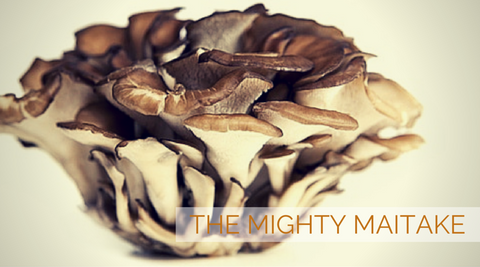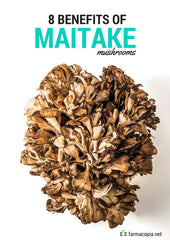 Author: Lily Mazzarella
Author: Lily Mazzarellaneither plant nor animal nor mineral…….Get to know a mushroom!
MAITAKE (grifola frondosa) a.k.a. “Hen of the Woods“
If you have never eaten a maitake mushroom, I am a little jealous: you get to experience this exquisite creature for the first time. Maitake, known to many only in extract or supplement form, is by far my favorite eating mushroom. It’s been a few years since I’ve mushroom-hunted (and the California drought isn’t helping), but when I do, this is one of the handful of fungi I feel comfortable gathering in the wild.* This polypore grows in temperate, hardwood forests, in characteristic clusters at the base of trees—often oaks–that resemble the puffed-up tail feathers of chicken. It is prized and eaten world-round, from Japan to Italy to New York. They can be a little pricey—but are well worth it. These beauties can do a lot for you.
*That said, don’t collect mushrooms in the wild unless you are absolutely sure of what you are doing. Many mushrooms have “look-alikes” and every year people die from eating poisonous varieties.
Here’s a quick rundown of just a few of Maitake’s charms and benefits:
 1. Extreme umami: Maitake is a rich source of l-glutamate, the amino acid responsible for the umami flavor we associate with savory foods. Once maitake is cooked and has lost its water weight, it is both nutrient-dense AND one of the most richly flavored foods around. As such, it requires little in the way of preparation, and satisfies vegans and omnivores alike. You’ll see what I mean when we get to the simple, delectable recipe below.
1. Extreme umami: Maitake is a rich source of l-glutamate, the amino acid responsible for the umami flavor we associate with savory foods. Once maitake is cooked and has lost its water weight, it is both nutrient-dense AND one of the most richly flavored foods around. As such, it requires little in the way of preparation, and satisfies vegans and omnivores alike. You’ll see what I mean when we get to the simple, delectable recipe below.
2. Immune modulator par excellence: Like other medicinal mushrooms, maitake is a full of immune-active compounds, including polysaccharides and sterols. Studies—including in vitro (“test tube”), in vivo (live cells or tissue), and in real live humans—show promise in multiple realms.
3. Breast cancer: Small human clinical trials at Sloan-Kettering found maitake extract to stimulate the immune cells of women with breast cancer.
4. Renal cell carcinoma: In vitro studies show promise for this difficult-to-treat and deadly cancer. Interestingly, 2 studies combined maitake extract with vitamins C and K to increase apoptosis (programmed cell death) of cancer cells.
5. Diabetes: Maitake has exhibited blood sugar lowering and insulin-lowering effects in multiple studies; it may also protect pancreatic islet cells, which produce insulin.
6. Intestinal Inflammation: In promising in vitro studies, maitake extract “turns down” TNF-alpha, an upstream inflammation-promoter. The mushroom contains potent anti-oxidants which may be responsible for this effect.
7. Immune stimulation/Anti-cancer: Multiple in vitro, in vivo, and human studies show that maitake can stimulate NK cell production and activity. NK cells offer first-line defense against virus and cancer-affected cells. Also shown: stimulation of bone marrow, anti-tumor, anti-angiogenesis, and increased induction of apoptosis of various cancer cell lines.
8. Reduction of chemotherapy toxicity?: A study in mice showed reduction in cisplatin-induced nephrotoxicity—kidney damage—and well as improvements in treatment outcomes when they were co-administered.
For a delicious one-pan maitake recipe check out our Pan-roasted Maitake with Crisped Sage recipe.

